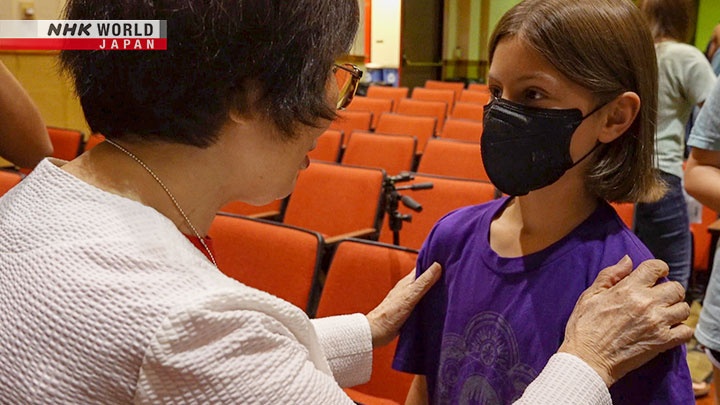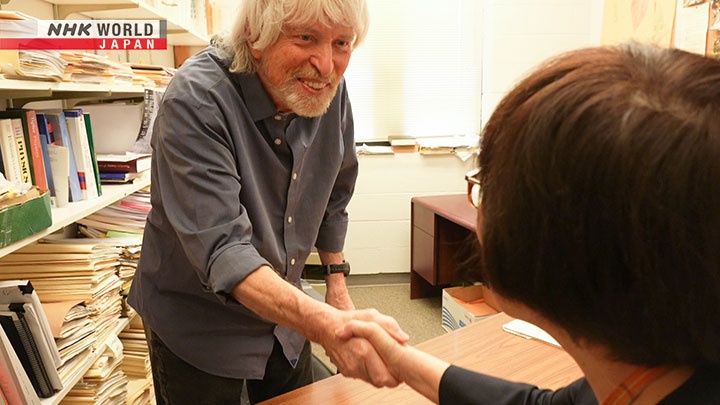Keiko Ogura, age 85, has spent her life talking to the world about her experiences as an A-bomb victim in Hiroshima. Feeling helpless in the wake of the Russian invasion of Ukraine, she decides to participate in a symposium in a small college town in Idaho, U.S.A., where many people accept the existence of nuclear weapons. Determined to hear their side of the story, she engages in dialogue and discovers circumstances she had never understood before. When it's her turn to give a presentation, how does she convey her own beliefs?


Transcript
Welcome to our program, part of a series that introduces people in various locations in Japan as they really are.
Today we feature an 85-year-old woman who flew from Hiroshima to the United States.
I'm feeling my age,
so this will be my last trip overseas.
My name is Keiko Ogura.
Keiko Ogura was an A-bomb victim in Hiroshima.
She has talked about her experiences to many people both in Japan and abroad.
I saw the hell of the people's lives.
We shall not repeat the evil.
She has often found differences in the way people think about the atomic bomb.
I'm scared.
Hoping to overcome those differences, Keiko decided she had to look squarely at the root cause of the way Americans thought of it.
Dropping the bombs was...it would save lives eventually?
Like for the war?
So did you come across any reason?
Is that true?
Absolutely that was a reason.
Keiko begins her final trip to America to do something she hasn't done before.
What will she find there?
On August 5, 2022, the day before the anniversary of the bombing of Hiroshima,
Keiko spoke to a group of foreigners who were visiting the city.
The flash was so bright, I couldn't see anything and everything turned to white.
I was blown, beaten on the road.
She gives this talk every year, but something is different this time.
I'm tired.
It's hard to describe my dismay.
My job's not done.
There's so much left to do.
Keiko's dismay is caused by an unexpected shift in international attitudes towards nuclear weapons.
We will use all means at our disposal.
Russian president Vladimir Putin, who invaded Ukraine,
has often said things that can be interpreted as a threat to use nuclear weapons.
I never dreamed I'd hear
a head of state
say things like,
"I'll use nuclear weapons."
I was shocked beyond my imagination.
When Keiko was 8 years old, she became a victim of the A-bomb just 2.4 kilometers from the epicenter.
Blown into the air by the blast, she lost consciousness.
When she came to, she saw people crowding together on the stone steps of a shrine, begging for help.
She says they died while searching for water.
I'll never forget that scene.
It was impossible to believe
any human being could do this.
Thinking that she wanted to share the voices of the bomb victims with the world, she taught herself English and became an interpreter.
She has been telling people about her experience ever since.
But now, she finds that the world is moving in the opposite direction of her message.
The current state of the world
is terrifying.
Some say nuclear weapons are
smaller and easier to use.
That's an affront to those who have died.
It makes me feel helpless.
One day, Keiko received an invitation from a university in the United States.
They were holding a symposium on nuclear weapons and wanted her to share her experience with them.
September.
Keiko lands in America.
She's accompanied by her son Shiro, who keeps a close watch over her.
I'm exhausted.
A long trip.
Keiko has come to the town of Moscow in the northwestern state of Idaho.
It's a small college town of 25,000 people.
She has one important purpose for this trip.
I want to find out the true
state of the world.
I have to know that before I can act.
The day of the symposium.
Keiko participates in a seminar held by the U.S. Air Force.
Military personnel and civilians discuss the bombing of Hiroshima.
The Manhattan Project was massive.
The snowball effect had already started, right?
The domino effect had already started.
We weren't going to back out of this.
Audience members ask many questions.
I know that in the past, one of the arguments for dropping the bombs was, it would save lives eventually, like, for the war.
So did you come across any research? Is that true? Yep.
Absolutely that was a reason.
You think of how many years that went on.
Again, numbers I can't comprehend of lives lost.
If we hadn't dropped those bombs and seen what they do to cities,
what would've happened in the Cold War between Russia and the United States?
Absolutely.
I mean there's no question if it hadn't happened then,
it was only going to be a matter of time when you have this weapon at your disposal, right? So, yeah.
Quite possibly with much bigger bombs.
Yes, that's a solid point.
Ah, so this is the education they get.
They live with the A-bomb.
That's what America is.
This isn't the first time that Keiko has confronted this different way of thinking.
Nineteen years ago, Keiko visited Washington D.C.
She served as an interpreter for another A-bomb victim named Sunao Tsuboi, who passed away in 2021.
The purpose of the visit was to protest an exhibit that featured the Enola Gay, the plane that dropped the bomb.
However...
I'm scared.
She couldn't even get close to the bomber.
She clearly remembers watching Sunao walk up to it.
So this is what did it.
Sunao was 1.2 kilometers from the epicenter when the bomb exploded.
His head and back were severely burned, and he spent 40 days suspended between life and death.
Enola Gay above the mushroom
cloud, with him writhing below.
I'm sure he clearly felt that.
He was confronting it.
He was resolute and full of anger.
Even so, Sunao continued to engage in dialogue with Americans.
He visited the families of victims of the 9/11 terrorist attack and tried to understand the pain America also felt.
It's no good just talking
from the victims' perspective.
To the end, Sunao valued dialogue.
That's a lesson I thoroughly
learned from him.
The third day of her visit...
Keiko embarks on a new mission.
She sets out to understand the thinking of those who developed and dropped the bomb.
She had never tried to do that before.
So.
Lawrence Johnston.
Oh, yes.
He was a professor through all these years.
To see the mushroom, and then, they measured the size of the explosion.
Lawrence Johnston was a member of the development team.
He was also tasked with measuring the bomb blast from above.
I (It) was so interesting.
There is another airplane, you know.
Measuring the effect of that, yeah.
Ruprecht Machleidt, who worked in the same lab, tells Keiko about Johnston's life.
To the end of his life, Johnston said that dropping the bomb was the right thing to do.
But there was something behind that pronouncement.
I have nothing to do, because I'm a scientist.
I'm not a politician.
I'm not a moral philosopher.
"You shut up, you shut up."
"You good to make the bomb for us, but now it's our bomb."
"We do what we want."
I think scientists know the menace of the nuclear weapons quite well.
So, because of that, and deep in their hearts, they want to say no, not (don't) use that.
Keiko asks another question.
Scientists working in Los Alamos, you know, being checked by government or authorities?
So they had to shut up.
When people, they have freedom of speech, but that only means you don't go to jail,
but there are other ways to punish people.
Fire them, make them jobless.
Their morals as people,
their feelings as scientists...
Hearing it for the first time
was surprising to me.
Trying to see why those on the
other side think as they do...
I think we have to understand that.
Truths found in different ways of thinking must be known and understood.
This is what Keiko learned by venturing forth.
The day of Keiko's presentation arrives.
Reflecting increased concern about nuclear weapons, 400 people attend.
Additional chairs have to be set out.
Now it's Keiko's turn.
She wants listeners to understand Hiroshima.
If I don't resonate in their hearts,
they'll think it's just a far-away
event from long ago.
They must understand that I, who
stand before them, was there.
It's so difficult for me to speak in front of you.
But now, I want to share what I saw, what I felt, what I smelled those days.
And then, this is the scene I saw in front of me.
Many people were coming and swollen faces, and some person showing internal organs or so,
and the scene was a feeling like a ghost or zombie, I don't know how to say.
Give me water.
As soon as hearing water, like a chorus.
Everybody said: water, water, water, that's all.
I got water delivered.
People seemed so happy, but in front of me, two persons died.
I couldn't understand.
So, such kind of trauma continued so many years I should say.
Keiko concludes her presentation with a final plea.
Whether we were under the mushroom cloud or not.
So, please, please think together what we can do.
I don't know the answer, but we have to work together.
Thank you very much.
On her last day, Keiko feels completely exhausted.
I'm so tired. Let me sit.
Water?
Thank you.
Worse than ever before.
I can tell how hard it is for her
to meet and be with so many people.
Despite her exhaustion, there was still something Keiko desperately wanted to convey to the children who had come.
We do not hate American citizens.
We hate war.
Understanding other(s), and we need to overcome hatred.
We need to talk, try to understand other people.
I hope you'll remember today, OK?
Thank you for telling the story.
This is why she continues her work.
I'm glad Shiro went with me.
I could hardly get up and down the stage.
I'm glad I went.
It's small.
It's precious.
P.S. you have a heart of gold-you are so brave.
It feels like she's put in all the
words of praise she knows.
I think they feel that Hiroshima
has come closer to them.
It's my heartfelt wish that we can
make the seeds we plant today
bloom into flowers as large as possible.